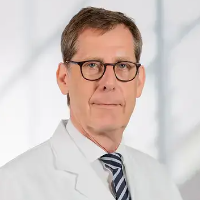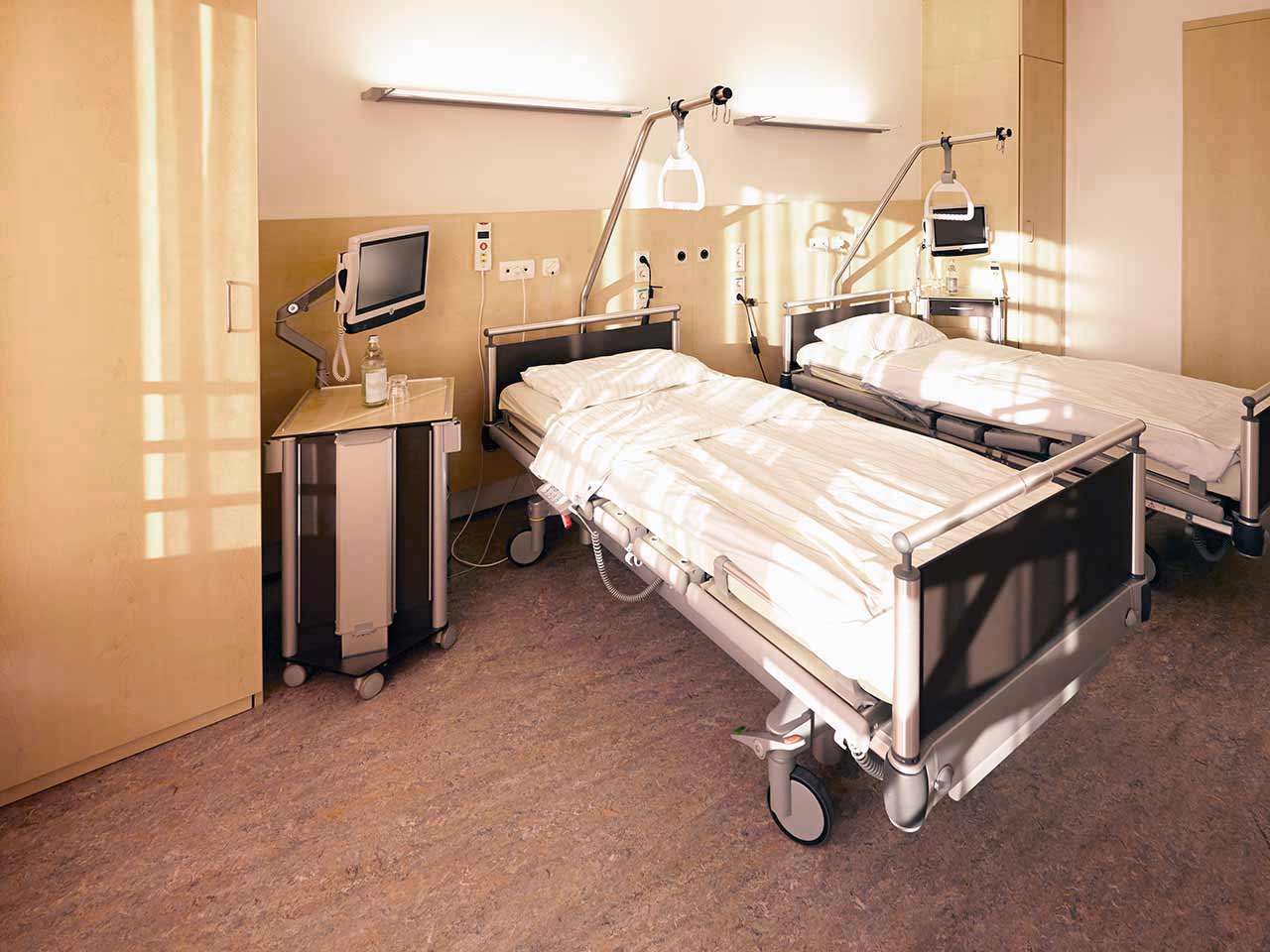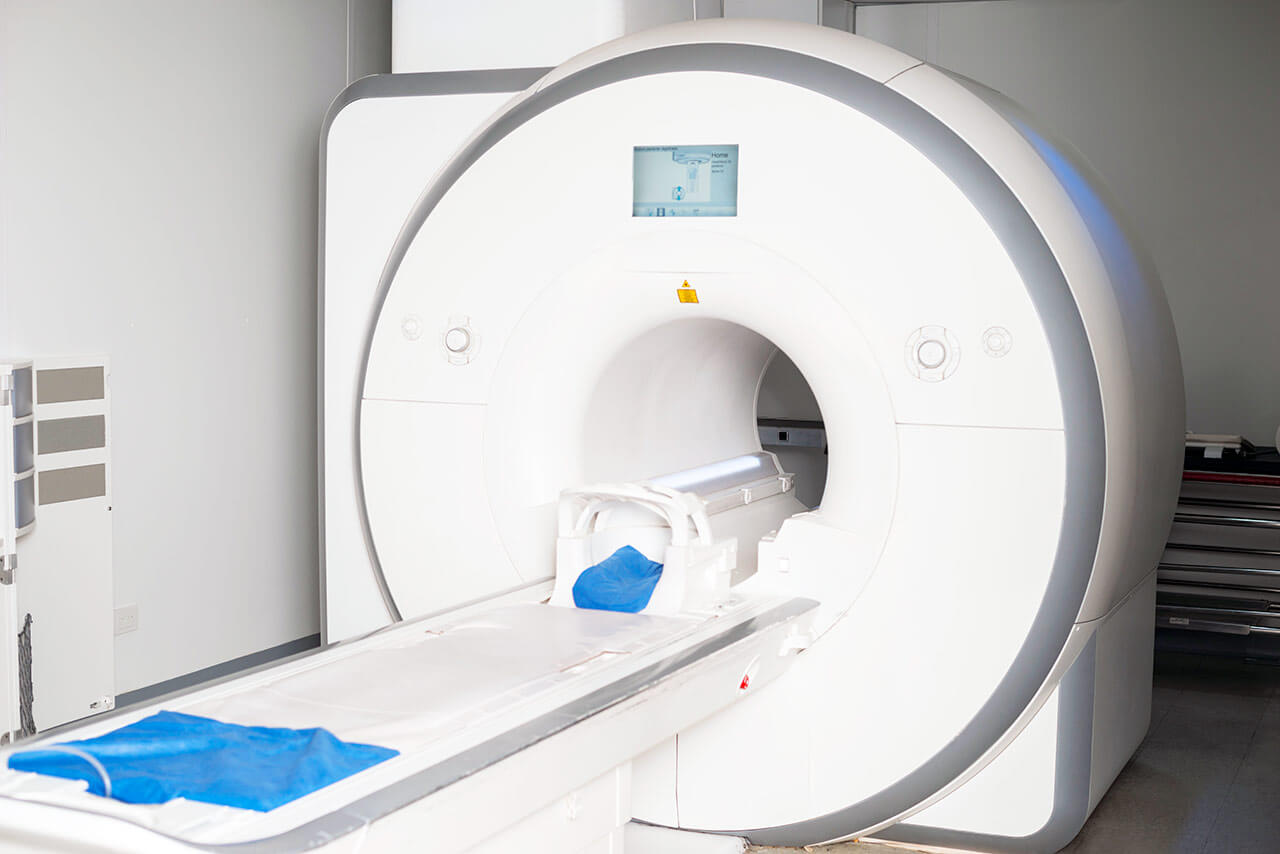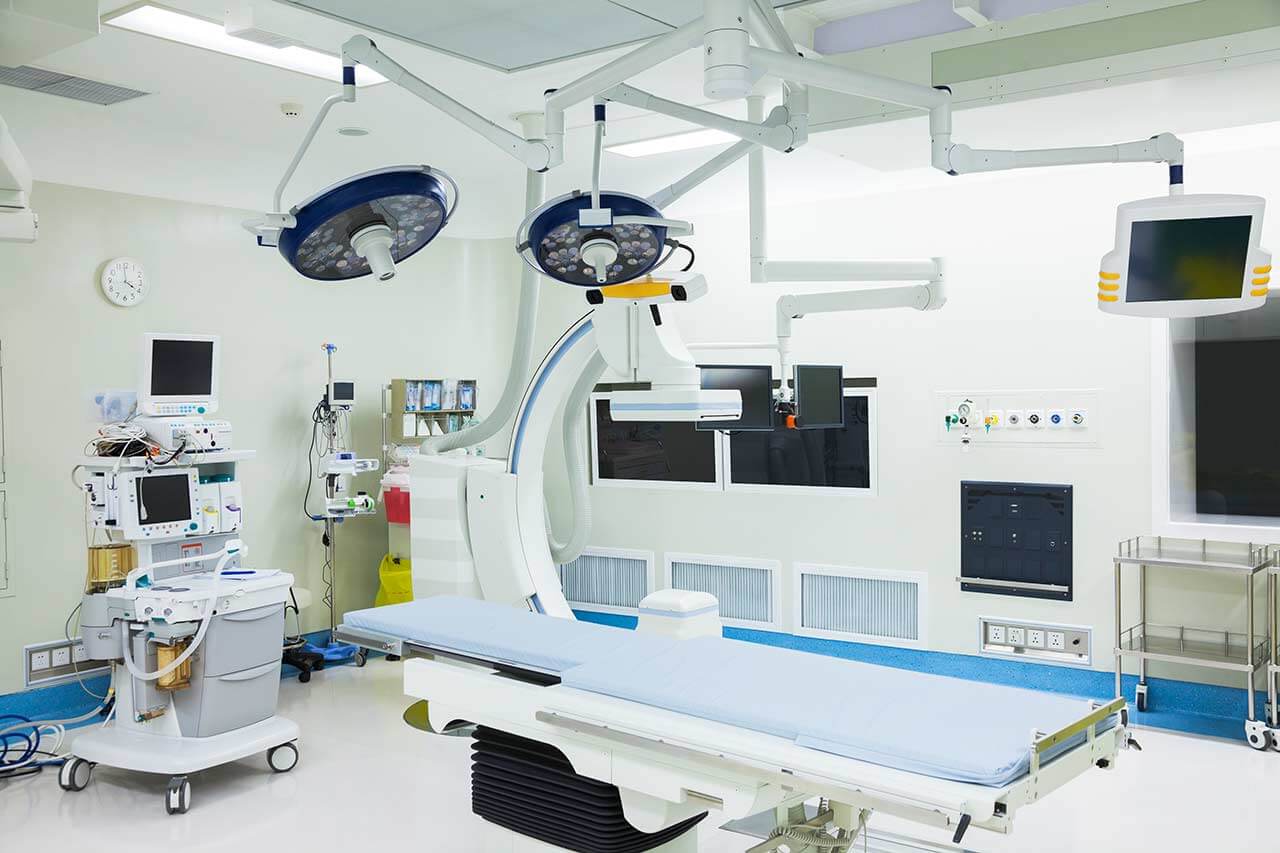
About the Department of Cardiology at Nuremberg Hospital
The Department of Cardiology at the Nuremberg Hospital offers high-precision diagnostics and conservative and interventional treatment methods for heart defects, heart valve diseases, myocardial diseases, coronary artery diseases, and arrhythmias. The department's diagnostic rooms have state-of-the-art equipment for echocardiography, electrocardiography, Holter monitoring, 24-hour blood pressure monitoring, coronarography, computed tomography, magnetic resonance imaging, etc. The department also houses a modern Cardiac Catheterization Laboratory where minimally invasive interventional procedures are regularly performed, including transcatheter aortic valve implantation, MitraClip mitral valve repair, TriClip tricuspid valve repair, occluder placement, and other procedures. The department's cardiologists admit more than 5,770 inpatients and about 3,880 outpatients every year. The department's medical team consists of 75 highly specialized physicians and more than 200 nursing staff members, who have all the necessary resources for heart restoration. The department is headed by Prof. Dr. med. Matthias Pauschinger.
The department's cardiologists focus on patients with congenital and acquired heart defects. The specialists most often have to deal with the treatment of stenosis and insufficiency of the aortic, mitral and tricuspid valves, atrial and ventricular septal defects, and patent foramen ovale. More than 500 interventional procedures for heart defects are performed in the department annually, so cardiologists have unique experience in this area of specialization. The department is certified by the German Cardiac Society (DGK) as a Center for Transcatheter Aortic Valve Implantation and a Center for Mitral Valve Repair.
The transcatheter aortic valve implantation (TAVI) procedure is performed using catheter-based techniques with an approach through the inguinal or subclavian artery without any chest incisions. The intervention involves replacing the damaged aortic valve with an artificial one without removing the patient's own heart valve. The aortic valve prosthesis is delivered to the pathological focus in a folded state using a catheter. Once securely positioned, the artificial valve is fixed, and the catheter is removed from the vascular system. All manipulations are performed by a cardiologist under X-ray guidance, which ensures their high accuracy and safety. The TAVI technique is an excellent alternative to surgery because it allows doctors to avoid traumatic chest incisions, facilitates quick patient recovery, and carries a minimal risk of postoperative complications. At the same time, TAVI is highly effective.
The department also performs more than 100 MitraClip mitral valve repair procedures every year. This method is used to treat mitral regurgitation in patients with contraindications to classical surgery. The essence of the interventional procedure is as follows: a cardiologist performs a femoral artery puncture, through which a catheter with a MitraClip device is inserted under imaging guidance. The MitraClip is positioned to bring the mitral valve leaflets tightly together at the point of maximum regurgitation, thus eliminating the reverse blood flow into the left atrium during ventricular contraction. The procedure is performed under general anesthesia.
The department's cardiologists have long experience in the treatment of heart rhythm disturbances, including bradycardia, tachycardia, and tachyarrhythmias. The doctors have all the modern treatment methods in their arsenal to treat patients with arrhythmias. Whenever possible, the specialists strive to use drug therapy only, but if it does not give the desired result, interventional therapy may be indicated for patients. The optimal treatment approach is selected depending on the type of arrhythmia. For example, radiofrequency catheter ablation or cryoablation is successfully performed to treat tachyarrhythmias, while the implantation of a pacemaker or defibrillator is the preferred method for normalizing heart rhythm in cases of bradycardia or tachycardia.
The department's key clinical focuses include:
- Diagnostics and treatment of congenital and acquired heart defects
- Diagnostics and treatment of arrhythmias
- Diagnostics and treatment of heart failure
- Diagnostics and treatment of coronary heart disease
- Diagnostics and treatment of cardiomyopathies
- Diagnostics and treatment of inflammatory heart diseases: myocarditis, endocarditis, and pericarditis
- Diagnostics and treatment of acute coronary syndrome
- Diagnostics and treatment of other cardiovascular diseases
The department specializes in the following interventional procedures:
- Transcatheter aortic valve implantation (TAVI)
- MitraClip mitral valve repair
- TriClip tricuspid valve repair
- Transcoronary ablation of septal hypertrophy (TASH)
- Catheter-based interventions for the implantation of occluders
- Radiofrequency catheter ablation
- Cryoablation
- Cardiac resynchronization therapy
- Catheter-based and hybrid interventions for the implantation of pacemakers and defibrillators
- Cardiac contractility modulation
- Electrical and pharmacological cardioversion
- Percutaneous transluminal coronary angioplasty
- Rotational coronary atherectomy (rotablation)
- Other treatment methods
Curriculum vitae
Higher Education and Professional Career
- 1981 - 1987 Medical studies, University of Ulm.
- 1987 Admission to medical practice.
- 1988 Thesis defense, Department of Cardiology, University Hospital Ulm.
- 1987 - 1989 Assistant Physician, Department of Anesthesiology and Intensive Care, Filderklinik Hospital in Filderstadt.
- 1989 - 1990 Scholarship from the German Research Foundation (Pa 369/1-1), Institute of Pharmacology at the Heidelberg University, Working Group of Prof. Dr. med. R.E. Lang. Subject: "Studies of the function of neuropeptide Y and its C-terminal flanking peptide (CPON) in the heart muscle".
- 1990 - 1994 Research Fellow, Department of Cardiology, Pulmonology and Angiology, University Hospital Duesseldorf.
- 1994 - 1998 Research Fellow, Department of Cardiology and Pulmonology, Charite University Hospital Berlin.
- 1998 Board certification in Internal Medicine.
- 2000 Habilitation and Venia legendi in Internal Medicine, Charite University Hospital Berlin.
- 2001 Specialization in Cardiology.
- 1999 - 2004 Senior Physician, Department of Cardiology and Pulmonology, Charite University Hospital Berlin.
- 2006 Extraordinary Professorship, Charite University Hospital Berlin.
- 2004 - 2007 Managing Senior Physician and Deputy Head of the Heart Center at the Charite University Hospital Berlin.
- Since 01.10.2007 Head Physician, Department of Cardiology, Nuremberg Hospital.
- 2008 Extraordinary Professorship, University of Erlangen-Nuremberg.
- 2010 Additional qualification in Special Internal Medicine.
- 2014 Professorship for Internal Medicine and Cardiology, Paracelsus Private Medical University.
Memberships in Professional Societies
- German Society of Internal Medicine.
- German Society of Cardiology.
- Working Group of Managing Physicians at Cardiology Clinics (ALKK).
- Transplant Center Erlangen-Nuremberg.
Prizes
- 1995 Research Prize, Department of Human Medicine, Free University of Berlin; 2nd Prize for the work on "Changes in the expression of adenine nucleotide translocator isoform genes in the heart muscle of patients with dilated cardiomyopathy and myocarditis".
- 1998 Research Prize, Department of Human Medicine, Free University of Berlin; 2nd Prize for the work on "Study of the specificities of the myocarditis in mice with severe combined immunodeficiency".
- 1999 Research Prize, Department of Human Medicine, Free University of Berlin; 1st Prize for research on the subject "The effect of virus persistence on the clinical course of dilated cardiomyopathy".
- 2000 Research Prize, Department of Human Medicine, Free University of Berlin; 1st and 3rd Prizes for research on the subject "Ultrasound-guided stent implantation in acute myocardial infarction reduces the frequency of complications and improves long-term results: the results of the BESSAMI research" and "Therapy of enteroviral and adenoviral heart muscle diseases".
- 2001 Research Prize, Department of Human Medicine, Free University of Berlin; 3rd Prize for research on the subject "The need for intravascular ultrasound during the treatment of intra-stent restenosis using brachytherapy".
- 2005 1st Poster Award at the Tripartite Meeting "Heart Failure 2005" in Lucerne. Subject: "The importance of NT-proBNP in the diagnostics of diastolic dysfunction: correlation with catheter examinations of the cardiac conduction system".
Photo of the doctor: (c) Klinikum Nürnberg





